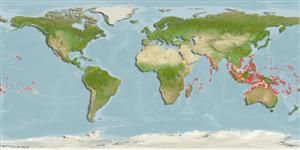Common names from other countries
Teleostei (teleosts) >
Ophidiiformes (Cusk eels) >
Carapidae (Pearlfishes) > Carapinae
Etymology: Encheliophis: Greek, enchelys, = eel + Greek, ophis = serpent (Ref. 45335).
More on author: Richardson.
Environment: milieu / climate zone / depth range / distribution range
Ecology
Marine; reef-associated; non-migratory; depth range 0 - 30 m (Ref. 37816). Tropical; 25°N - 35°S
Indo-Pacific: Red Sea and the east coast of Africa (Ref. 583) to the Society Islands (Ref. 9710), as far north as Taiwan, but not Hawaii, and probably south to Tasmania.
Size / Weight / Age
Maturity: Lm ? range ? - ? cm
Max length : 19.0 cm TL male/unsexed; (Ref. 6347)
Dorsal soft rays (total): 33 - 38; Anal soft rays: 53 - 61; Vertebrae: 116 - 128. Eel-like, moderate to shallow body depth; maxilla free and movable; cardiform teeth present; branchiostegal membranes partly or completely united; swim bladder with thin terminal membrane or bulb; lacking enlarged dentary or premaxillary fangs, dentary diastema, pelvic fins, and swim bladder rocker bone (Ref. 34024).
This uncommon (Ref. 34024) pearlfish inhabits the coelom and respiratory trees of some holothurians, especially Stichopus chloronotus and Holothuria argus. It is apparently in competition with Jordanicus gracilis [= Encheliophis gracilis] for its preferred host H. argus. Although most occur singly, there is a tendency towards sexual pairing inside the host. Found to depths over 30 m (Ref. 9710). Stomach contents which include amphipod, shrimp and fish indicate non-parasitic, foraging habits (Ref. 6395). Leaves host at night to prey on small fishes and shrimps (Ref 90102).
Life cycle and mating behavior
Maturities | Reproduction | Spawnings | Egg(s) | Fecundities | Larvae
Nielsen, J.G., D.M. Cohen, D.F. Markle and C.R. Robins, 1999. Ophidiiform fishes of the world (Order Ophidiiformes). An annotated and illustrated catalogue of pearlfishes, cusk-eels, brotulas and other ophidiiform fishes known to date. FAO Fish. Synop. 125(18):178p. Rome: FAO. (Ref. 34024)
IUCN Red List Status (Ref. 130435)
CITES (Ref. 128078)
Not Evaluated
Threat to humans
Harmless
Human uses
Fisheries: of no interest
Tools
Special reports
Download XML
Internet sources
Estimates based on models
Preferred temperature (Ref.
115969): 25.3 - 29.3, mean 28.5 (based on 3175 cells).
Phylogenetic diversity index (Ref.
82804): PD
50 = 0.5078 [Uniqueness, from 0.5 = low to 2.0 = high].
Bayesian length-weight: a=0.00102 (0.00046 - 0.00225), b=3.06 (2.88 - 3.24), in cm Total Length, based on all LWR estimates for this body shape (Ref.
93245).
Trophic level (Ref.
69278): 3.7 ±0.63 se; based on food items.
Fishing Vulnerability (Ref.
59153): Low vulnerability (10 of 100).
